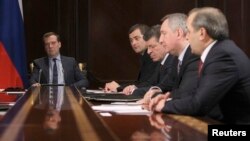MOSCOW —
Russia signaled on Monday it would backstop the European Union's bailout of Cyprus despite anger that the weekend rescue deal would impose heavy losses on uninsured depositors, many of them Russian.
President Vladimir Putin ordered his government to negotiate the restructuring of a bailout loan it granted to Cyprus in 2011, having rejected Nicosia's request for easier terms during crisis talks last week.
Putin "considers it possible to support efforts ... aimed at overcoming the crisis in the economy and banking system of this island state,'' his spokesman Dmitry Peskov said.
Russia has repeatedly expressed its dismay at Europe's handling of the debt crisis in Cyprus, while resisting the entreaties of President Nicos Anastasiades to offer significant financial support of its own.
But, following the agreement of a 10 billion euro ($13 billion) European bailout deal over the weekend, Moscow's position has softened.
While Russia has complained over discrimination against businesses that rely on Cyprus as an offshore center, the Kremlin has been careful not to become embroiled in a potentially open-ended financial and strategic commitment that could become a nexus of friction with Europe.
Nevertheless, Prime Minister Dmitry Medvedev - who ranks below Putin in Russia's ruling hierarchy - earlier criticized the bailout deal that will inflict heavy losses on uninsured deposits of over 100,000 euros at the two main Cypriot banks.
"The stealing of what has already been stolen continues,'' Medvedev was quoted by news agencies as telling a meeting of government officials.
Cyprus had requested an extension of the existing 2.5 billion euro Russian loan, and a reduction in the interest it charges to 2.5 percent from 4.5 percent.
Russia also last week turned down a Cypriot offer of stakes in its banks and offshore energy reserves in return for around 6 billion euros in new financing, a sign that Moscow is reluctant to become over-extended financially and geopolitically despite a strong balance sheet that is underwritten by oil revenues.
Russians are believed to account for most of the 19 billion euros of non-EU, non-bank money held in Cypriot banks at the last count by the central bank in January. Of 38 billion euros in deposits from banks, 13 billion came from outside the EU.
Speaking after the meeting with Medvedev, First Deputy Prime Minister Igor Shuvalov said losses to Russian investors in Cyprus were not yet clear.
He also said that the Cypriot unit of state-controlled VTB, Russian Commercial Bank, would not be affected by measures taken by the government. Russia hopes that further financial support will not be needed.
"What is happening is a good signal to those who plan to move their capital to ... Russian banks,'' he was quoted as saying. "We have very stable banks.''
President Vladimir Putin ordered his government to negotiate the restructuring of a bailout loan it granted to Cyprus in 2011, having rejected Nicosia's request for easier terms during crisis talks last week.
Putin "considers it possible to support efforts ... aimed at overcoming the crisis in the economy and banking system of this island state,'' his spokesman Dmitry Peskov said.
Russia has repeatedly expressed its dismay at Europe's handling of the debt crisis in Cyprus, while resisting the entreaties of President Nicos Anastasiades to offer significant financial support of its own.
Eurozone Bailouts
Countries that received Eurozone bailouts:- Spain, 2012: $129 billion
- Portugal, 2011: $100 billion
- Ireland, 2010: Ireland: $110 billion
- Greece, 2010 & 2012: $316 billion
While Russia has complained over discrimination against businesses that rely on Cyprus as an offshore center, the Kremlin has been careful not to become embroiled in a potentially open-ended financial and strategic commitment that could become a nexus of friction with Europe.
Nevertheless, Prime Minister Dmitry Medvedev - who ranks below Putin in Russia's ruling hierarchy - earlier criticized the bailout deal that will inflict heavy losses on uninsured deposits of over 100,000 euros at the two main Cypriot banks.
"The stealing of what has already been stolen continues,'' Medvedev was quoted by news agencies as telling a meeting of government officials.
Cyprus had requested an extension of the existing 2.5 billion euro Russian loan, and a reduction in the interest it charges to 2.5 percent from 4.5 percent.
Russia also last week turned down a Cypriot offer of stakes in its banks and offshore energy reserves in return for around 6 billion euros in new financing, a sign that Moscow is reluctant to become over-extended financially and geopolitically despite a strong balance sheet that is underwritten by oil revenues.
Russians are believed to account for most of the 19 billion euros of non-EU, non-bank money held in Cypriot banks at the last count by the central bank in January. Of 38 billion euros in deposits from banks, 13 billion came from outside the EU.
Speaking after the meeting with Medvedev, First Deputy Prime Minister Igor Shuvalov said losses to Russian investors in Cyprus were not yet clear.
He also said that the Cypriot unit of state-controlled VTB, Russian Commercial Bank, would not be affected by measures taken by the government. Russia hopes that further financial support will not be needed.
"What is happening is a good signal to those who plan to move their capital to ... Russian banks,'' he was quoted as saying. "We have very stable banks.''





